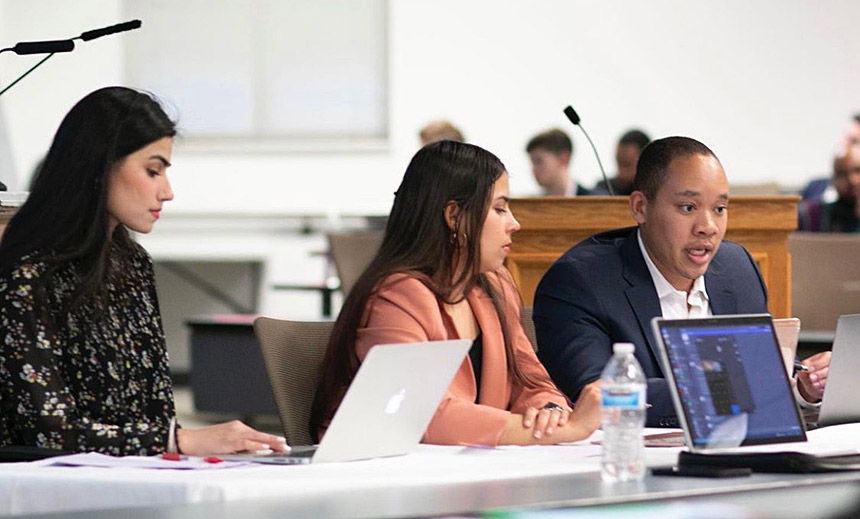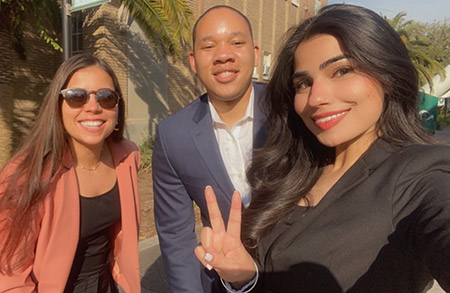
By Andrew Cohen
With the NBA playoffs just starting, fans will spend the next couple months watching elite performances from talented, tenacious, and tactical players. A lot like Berkeley Law students Nilam Faqhir ’23, Miles Jasper ’23, and Andrea Zachrich ’22, who recently won their own national hoops championship at the Tulane Professional Basketball Negotiation Competition.
Members of the school’s Alternative Dispute Resolution (ADR) program, the trio bested 43 other teams at the annual competition in New Orleans — a simulated free agency negotiation of real NBA players using the league’s current Collective Bargaining Agreement information. Jasper was also crowned with the Best Advocate award.
“This was very gratifying for our team,” Jasper says. “We spoke about wanting to bring the ADR team a trophy. We also knew that we worked well together and that a victory was obtainable if we put in the extra work. Winning best oral advocate was great, but I loved sharing the moment of a team win more with Andy and Nilam.”
Participants sharpened their negotiation skills, enhanced their knowledge of NBA contracts, and were judged by prominent experts from 14 teams and the league office — as well as agents, writers, and representatives from the National Basketball Players’ Association. The students also got to know these professionals better and network with them during a reception after the first day of competition.

“The best part about that was receiving their invaluable feedback and learning about their career paths,” Faqhir says. “After each round, our judges provided us with suggestions on how to improve. We incorporated their feedback into our next rounds and noticed a drastic improvement. It was also really fun meeting so many incredibly talented and knowledgeable people who have worked in the sports industry pretty much their entire lives.”
Berkeley Law’s ADR team competes in national and international competitions each year that involve diverse areas of law, including intellectual property, business, entertainment, environmental law — and sports. Faqhir, Jasper, and Zachrich met nearly every day for almost four weeks to prepare for this competition, and continued practicing even after arriving in New Orleans.
“It was so rewarding to showcase how much we learned,” Zachrich says. “The final round was unique. Instead of negotiating against another team, teams negotiated against a judge who works at the NBA on stage in front of all the judges while the other participating teams watched. We ended up securing a great deal for our ‘client,’ and it was awesome to realize just how much we had grown as a team throughout the competition.”
Nimble negotiating
During a virtual round before the in-person competition, Berkeley Law’s team pitched a contract extension of a rookie player. In the first round, Faqhir, Jasper, and Zachrich acted as general manager for Golden State Warriors guard Jordan Poole and pitched his contract extension to the NBA executives. In each of the following rounds, they negotiated a different player’s contract and alternated between representing the player or his team.
“We prepared by doing a lot of research on the league — the players we were representing and players similar to them, the teams we were representing and teams similar to them, the NBA’s Collective Bargaining Agreement, the salary cap per team, and the league’s lingo,” Zachrich says. “This competition required a lot of specialized knowledge, and we put in a lot of work as a team to learn what we needed to know to succeed in the competition.”
For every prompt, team members researched different aspects of the contract and tackled different sections of the CBA.
“Each of us had a specific role, but we also made sure to go with the flow in order to mimic a real-life negotiation,” Faqhir says.
Jasper’s experience certainly helped the cause. An intern with the Phoenix Suns last summer who also worked at Ballard Spahr, he brought a deep understanding of the salary cap, how trades work, and the current NBA landscape regarding player skill level and individual team situations.
He notes that NBA teams have two general career pathways, one on the general counsel/legal/business side and one on the basketball operations/salary cap/scouting side. Having long dreamed of becoming general counsel for a pro sports team, Jasper now sees the general manager route as a possibility.
“This competition completely altered my career trajectory as I’ve been able to break into the basketball operations side,” he says. “I have a job offer with an NBA team under their salary cap/basketball strategy group next school year, with the potential for a full-time offer. Now the pro sports and big law pathways are both available to me, which I’m truly grateful for.”